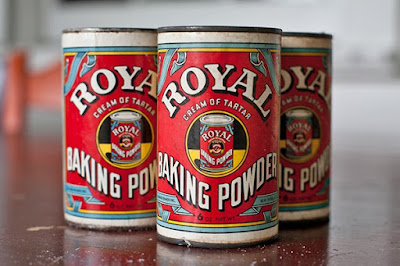I watched an episode of Who do you think you are from the UK the other day and was surprised to hear that two of Clare Balding's relatives had their financial success beginnings in Fort Wayne, Indiana. The product her relatives created was Royal Baking Powder.
The first baking powder consisted of cream of tartar, bicarbonate of soda, and starch. The starch kept the other two ingredients from reacting against each other.
I spent all morning trying to find a can of Royal Baking Powder, but to no avail. We have Rumford Baking Powder, Argo, and Clabber Girl here; You would think that a city with over 250,000 residents we would have more than three brands of baking powder to offer. Store brands don't count in my book.
Let me go back to the beginning, if I may. Brothers Cornelius and Joseph Hoagland formed a partnership in 1865 (the dates vary) to develop a baking powder company and they called it Royal Baking Powder Company. These men were a firm of druggists and lived in Fort Wayne, Indiana. The baking powder was made with cream of tartar at that time. In 1873, William Zeigler and John H. Seal were brought in as investors.
"The business grew for three or four years, when it was discovered that alum and soda made a stronger leaven, and cheaper. Worse still, alum was plentiful. Anybody could go into its manufacture, and many did. The Royal, to control the cream of tartar industry, had contracted to take from European countries immense quantities of argol, the wine-lees from which cream of tartar is made. They had to go on making the more expensive baking-powder or break a contract. That would be "bad business."
Later Zeigler claimed to have organized the company and he was the treasurer, but Joseph Hoagland claimed to be president. Hoagland put a lot of money into advertising the brand, spending a half million dollars a year in advertising. After a few years the partnership broke up.
 |
| I have Argo in my cabinet |
Then Alum war began. Why have a war over baking powder? According to Shirley Corriher from her book Bakewise:
Aluminum-free baking powders react with liquid and not with heat. And that, Corriher explains, makes them "faster acting that most double-acting powders. You need to move fast and get cakes made with [aluminum-free baking powders] into the oven promptly since most of the bubbles are released shortly after mixing."
On December 10, 1899 the New York Times published Hoagland's obituary stating that Joseph Hoagland had been the president of the company for over 30 years. It seems both men made the same claim.
Today, baking powder labels boast that the product is aluminum free. More importantly better for you.
Sources:
Bakewise by Shirley Corriher
The Baking Powder Controversy, Abraham Cressy Morrison. Published date 1904
www.whatscookingamerica.net/baking-powder
http://beachpackagingdesign.com/boxvox/7-quotes-about-royal-baking-powder

